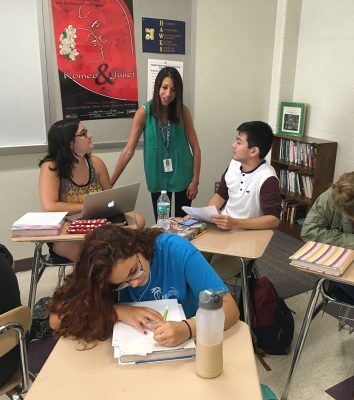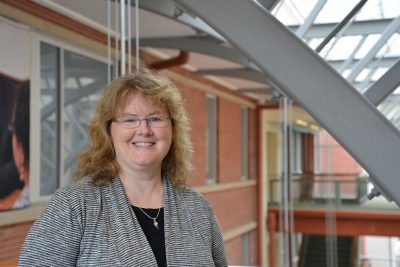Editor’s Note: Kristin English ’03 (ED), ’04 MA — an English teacher since 2004 at Newtown High School in Newtown, Conn., and an alumna of the Neag School’s Integrated Bachelor’s/Master’s Program — shares her insights on what makes the profession of teaching most meaningful to her.
It was one of those perfect summer days. It wasn’t quite noon, so the temperature hadn’t yet reached its peak. I could feel the sun on my shoulders. I felt good. Content. I had just finished my 12th year of teaching.

In those 12 years, I had been through this standardized test, that standardized test, Common Core; I had taught more than 1,200 students; read and graded thousands of essays; and worked for a wide variety of administrators. I’m not sure how long you have to teach to be considered a veteran, but I felt as close to it as I could get.
My 12th year of teaching was also my first full year as a working mother. And everything I knew about being a teacher — or, if I’m being honest, a human being — had been put to the test. Yet with summer having arrived, I see that while the year hadn’t necessarily been easy, it was a good one. I had been challenged and found it invigorating.
On this perfect summer day, I happened to be catching up over lunch with a former student of mine — someone who, near the end of her senior year of high school, had told me she wanted to become an English teacher. I remember that moment clearly. It took everything I had not to jump in the air and pump my fist in victory. I was thrilled. “We got a good one!” I had said aloud.
“This former student of mine … asked me, in all sincerity, if she was as “crazy” as everyone said she was for wanting to be a teacher.” Kristin English ’03 (ED), ’04 MA, English teacher
Who is “we”? English teachers. We are a team. We love books, and we love that we get to talk about them all day with groups of students. We love to write, and we love that there are moments when our students put pen to paper and spit out brilliance. We love asking our students to think beyond the classroom and to connect, in some way, to the world at large. And this former student isn’t just another smart lover of literature who wants to be a teacher; she’s everything you imagine a teacher should be. She’s kind, empathetic, funny, humble, gifted. She will set the bar for future teachers.
This former student of mine — now at the end of her sophomore year of college and soon officially starting her degree program in secondary English education — asked me, in all sincerity, if she was as “crazy” as everyone said she was for wanting to be a teacher.
I recognize that need for reassurance, that sense of uncertainty. At times, we, as teachers, feel like much of what we do can go unnoticed. There are always news standards, new acronyms, new testing methods. People will say to us, “I bet you love those summers off,” or “It must be nice to work part time.” It doesn’t always feel like we get as much respect from the community at large as we would hope.
I felt enormous pressure to answer her in a way that would keep her on our “team.” We couldn’t afford to lose this one. She was indispensable. I imagined all the thousands of future students who would sit in her classroom and learn from her. At the same time, my trying year rushed back, hitting me like a wave and enveloping me.
“No!” I had said. “I mean, yes, it’s hard, but for every challenge, there are at least four good things.” She nodded, breathed a sigh of relief, and we settled in for lunch, chatting about vacations, families, and life.
Yet I couldn’t quite let go of the feeling that my answer had been weak. If I were grading myself, I’d say something like, “Interesting point. Can you provide evidence?” The rest of the day, all I could think about was what I should have said. So here’s my evidence.
Yes. Teaching is hard. There are mornings when my alarm clock seems to be going off painfully early. There are days when I am sure I will never finish grading all of the papers I have in front of me. There are times when I feel like I shouldn’t sit down and relax because there’s too much planning to do. There are goals to reach, parents to speak with, colleagues to work with, meetings to attend, new educational acronyms and buzzwords.
Sometimes, I imagine walking into work, sitting at a desk, finishing my work by 5 p.m., and walking back out. But, of course, if we love our jobs even a little, if we desire to be good at our jobs, we know that 9-5 is a no more than a myth, no matter what the career. And, in the end, I love my job more than just a little. For about an hour, five times a day, I’m in a room with up to 25 young people, and we talk and we laugh. Sometimes, we dance. (It’s a whole Lord of the Flies thing, which you really have to see to believe.) I witness moments of kindness and genius and understanding.
Do I have to grade all of their papers? Yes. But in those papers, I get to see just how far they’ve come. Do I get overly excited when a kid finally uses a semicolon correctly or when they use “ubiquitous” in casual conversation? You bet I do. Does my face light up when a student talks about the effect of an unreliable narrator on the reader? You have no idea.
None of this can erase the difficulties, but it can make them more manageable. Who else gets to experience these simultaneously simple and complex pleasures every day?
Like any job, there will be good days, and there will be bad days. But unlike any other job, the good days are great. You feel like everything is possible. I’ve only ever been a teacher, so I don’t know if that’s true for other careers, but I know it’s true for this career. You won’t feel like you love it all days, but you will look back — maybe at the end of a long work day, or on a beautiful, perfect summer day, or at the end of your career — and you’ll feel fulfilled. You’ll feel good. Content.
Learn more about the Neag School’s teacher preparation programs, including the Integrated Bachelor’s/Master’s (IB/M) program and Teacher Certification Program for College Graduates (TCPCG).
Click the images below to check out other stories and videos featuring Neag School alumni talking about the value of teaching:

 Facebook
Facebook
 Twitter
Twitter
 LinkedIn
LinkedIn
